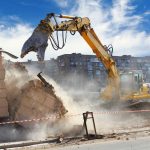What are the differences between demolition and deconstruction?
When it comes to the total or partial razing of a building, two terms are often used interchangeably: demolition and deconstruction – but they do not mean the same thing.
In this article, experts at Excavation Chanthier explain the differences between demolition and deconstruction, and the respective environmental and economic impact of these two approaches.
What is demolition?
In Quebec, demolition is the most common method for destroying a building or structure. It is an efficient and quick solution, especially when building materials cannot be reused.
The most common demolition methods rely on excavation equipment like excavators, bulldozers or explosives to bring down a structure. This is often the best option for buildings that are dangerous (post-disaster demolition) or need to be replaced quickly.
Demolition is a serious job that demands a methodical and controlled process to be done safely. To learn more, read our article about demolition project safety procedures.
What is deconstruction?
Deconstruction is a meticulous and more environmentally friendly process that is part of waste disposal on a construction site.
More precisely, deconstruction refers to dismantling a building or structure with the aim of recovering the materials and transporting them to relevant facilities, such as sorting centres, so that they can be reused or recycled.
The primary materials that can be recovered and reused on a construction site are:
| · Brick
· Shingles · Concrete · Metals |
· Wood
· Asphalt · Glass · Plastic |
· Gypsum |
Building deconstruction should always be carried out by qualified specialists using appropriate tools and equipment. At Excavation Chanthier, a demolition company in Montreal, experienced professionals plan and execute every project.
The main differences between demolition and deconstruction
Unlike demolition, deconstruction involves sorting and collecting any materials that could be recycled or reused. This method is an ecological and economic approach defined by the words recover, reuse and recycle.
Deconstruction involves making an effort to preserve any usable materials. It involves a demanding level of organization to sort materials by category directly onsite and avoid any contamination between them. Deconstruction tools and equipment are more sophisticated, permitting more precise work that consequently takes more time.
The deconstruction process is therefore more demanding than traditional demolition. It demands more manpower and more time to complete the project. However, the resale of salvaged materials can help recover some expenses. Deconstruction also allows you to cut costs and fees related to transportation to landfills and other waste management activities.
Demolition or deconstruction: finish your project with Excavation Chanthier
Ultimately, the decision between demolition and deconstruction depends on the individual project. Building demolition may be the best option for damaged structures that contain little or no salvageable materials.
Deconstruction, on the other hand, is part of a more responsible approach that involves reclaiming usable materials. However, it does take more time and manpower to do properly.
Whether for deconstruction or demolition, our experts have the equipment and skills to carry out any project in complete safety.
Are you in the Greater Montreal area and looking to do a demolition or deconstruction? Contact Excavation Chanthier today to tell us about your project and get






